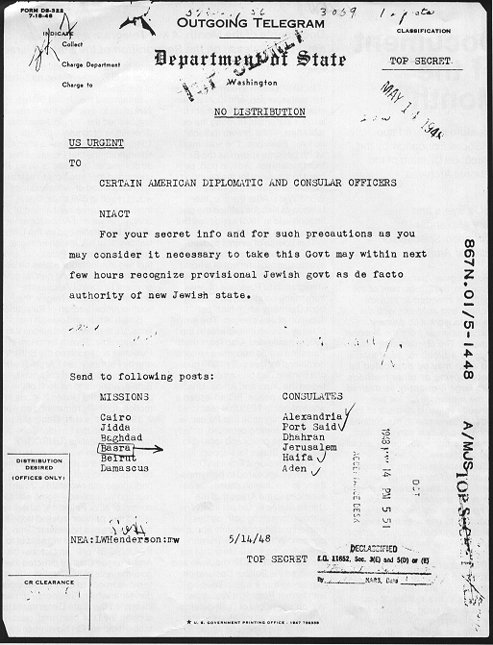America's role
What is America’s relationship to Israel?
Part of: Hey Alma’s Guide to the Israeli-Palestinian ConflictWhy is America Israel’s BFF? Why does America give Israel so much military assistance? How much does Israel play a role in shaping American foreign policy in the Middle East?
In sum, before Israel was even a modern state, American leaders have seen the ancient Jewish people and pioneering Americans as two peoples with shared values and beliefs. When the state of Israel was created in 1948, America viewed the nascent state as first a bulwark against Soviet influence, as well as a beacon of democracy in an undemocratic region.
All that and more…
Let’s start at the beginning
Leading up to Israel’s establishment in 1948, Jewish communities throughout the diaspora urged President Truman to support Israel.
Zionist leader Chaim Weizmann wrote to Truman, “The choice for our people, Mr. President, is between statehood and extermination. History and providence have placed this issue in your hands, and I am confident that you will yet decide it in the spirit of the moral law.”
Two days before David Ben-Gurion declared Israel’s independence, President Truman met with his secretary of state (George Marshall) and his White House counsel (Clark Clifford). Marshall argued Truman shouldn’t recognize Israel, because it would jeopardize relations with Arab countries, who controlled a large portion of the U.S. oil supply. Meanwhile, Clifford favored recognizing Israel.
Eventually Truman chose to support Israel — in part because of Christian teachings, and in part because of his close friendship with his former partner in a haberdashery, Eddie Jacobson. Eleven minutes after the State of Israel was declared, Truman sent out a telegram recognizing the new Jewish state:

Truman was new to a concept called “Judeo-Christianity” — the idea that Jewish and Christian traditions hold similar sacred values and traditions. He wrote, “Differences in how we choose to worship God strike me as being of relatively little importance in the face of an aggressive foe threatening to destroy all freedom of worship and other individual liberties.” (Qtd. in Andrew Preston’s Sword of the Spirit, Shield of the Faith, 420.) For Truman and other American leaders, the Cold War became a fight between freedom of faith and democracy versus “Godless” communism.
Although the Soviet Union recognized Israel upon its establishment in ‘48, the USSR soon allied itself with Arab powers in the Middle East. Naturally, the US allied with Israel, in opposition to the Soviets.
Therefore: Supporting Israel — the Jewish state — made sense for America. (Even though Truman was a smiiiidge anti-Semitic; “If Jesus Christ couldn’t satisfy the Jews while on earth, how the hell am I supposed to?” he told his Cabinet in 1946.)
What Truman did, however, was lay the groundwork for a strong relationship between the U.S. and Israel — a relationship that has remained to the current day.
Okay but *why* is that relationship so strong?
Like we said, it began as a shared values during the Cold War thing. The U.S. (under Truman/Eisenhower/Kennedy/Johnson) saw Israel as a bulwark against communism and the Soviet Union in the Middle East.
The alliance was really cemented during Nixon’s presidency and the 1973 Yom Kippur War, when America came directly to Israel’s aid, airlifting in a massive arms shipment and helping Israel stop Soviet-backed Arab armies. Since the 1970s, the U.S. has given Israel billions of dollars worth of grants in military assistance, making it the largest recipient of foreign aid. (Many are quick to point out that this assistance also provides economic benefits to the American economy, since Israel is required to spend a portion of the aid on U.S.-made military technology.) If you’re curious, here’s an interesting report on the history of U.S. aid to Israel.
And then 9/11 happened. In the wake of the September 2001 terrorist attacks in New York City and Washington, cooperation between the American and Israeli intelligence services intensified as America turned to face a militant foe (al-Qaeda) that borrowed ideologies and tactics from the enemies Israel had faced for decades.
Whew.
Where does American Jews’ relationship to Israel fit in?
American Jews had long been effective political advocates for Israel, securing bipartisan support for the Jewish state even while overwhelmingly voting Democratic and associating with liberal causes and organizations. In recent decades, especially after 9/11, evangelical Christians — a key segment of the GOP’s base — have taken up the pro-Israel cause.
Which U.S. Presidents tried to bring peace to the Middle East?
We’re so glad you asked! They all have, basically! To read up on that history, we highly recommend signing up for JTA’s newsletter “Israel & The Presidents,” which will walk you through U.S. presidents’ relationships to Israel, from Truman to Trump.
Yom Kippur War
The Yom Kippur War was a 1973 conflict fought between Israel and a coalition of Arab states. It began with a surprise Arab attack on the Jewish Day of Atonement.
David Ben-Gurion
David Ben-Gurion was the first prime minister of the State of Israel.